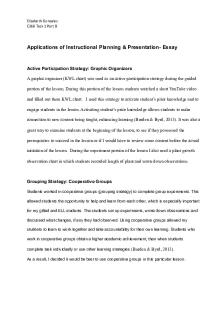Professional portfolio task 1 part B PDF

| Title | Professional portfolio task 1 part B |
|---|---|
| Course | Professional Portfolio |
| Institution | Western Governors University |
| Pages | 2 |
| File Size | 79.2 KB |
| File Type | |
| Total Downloads | 85 |
| Total Views | 153 |
Summary
philosophy statement...
Description
Task 1 Part B
B1. Discuss why teaching is important to you. I have always loved school. I always took it very seriously, and nothing could distract me from learning as much as I could. I want others to feel the same way about school as I did. B2. Describe your beliefs as a professional educator about teaching and learning. I believe that students must be internally motivated to learn – if they do not feel that they have a good reason to learn something, they will not make the effort. I also believe that students in general are social learners, and having opportunities to collaborate with their peers enhances their learning B2a. Describe how your beliefs about teaching and learning are supported by research. In his book Activating the Desire to Learn, Bob Sullo points out that when learning is meaningful to students, they are excited about it and motivated to learn rather than being motivated to misbehave and be unfocused on the task they need to do. Vygotsky supports that learning is guided by social interaction with peers and that children cannot be passive and still learn. He says that children must be involved in the learning in order to actually get anything from it (McLeod, 2018). B3. Describe the desired outcomes (e.g. problem solving, determination, standards) you want to foster in your students. I want to foster critical thinking in my students because that will be useful to them outside of school, and some of the content they may learn might not be used by them after they graduate, but it can still be incorporated with the content. I also want to foster determination. B3a. Describe the teaching methods (i.e. instructional strategies) you feel are important to achieve desired outcomes. Problem-based learning and discovery learning would help develop problem solving, especially if they are given the opportunity to work collaboratively and individually. Doing certain projects and solving certain problems as a group could help develop critical thinking skills because it would allow them to see multiple perspectives and solutions that might still be correct or useful but will also force them to decide which might be the best in the situation they are in. It would help foster determination because they would be given just enough information to discover the rest on their own. B3b. Describe the assessment strategies you feel are important to evaluate your desired outcomes. Product-based assessments graded by a rubric would be the best tool to measure their learning and how well they understand the content and how well they were able to problemsolve, since they would essentially be creating their own learning. B4. Describe characteristics of a positive relationship with students, families, and colleagues. A positive relationship begins with good communication. Teachers must clearly communicate their expectations, rules, etc. to students and their parents. Positive relationships are ones where no one has to question whether you mean what you say because you always follow up. Others also should not have to question where they stand with you (e.g. your mood doesn’t effect how you treat students, families, and colleagues). B4a. Discuss how your decisions and actions impact this positive relationship with students, families, and colleagues. My attitude would greatly impact relationships with all groups. A negative attitude will do the opposite. I would need to make the decision to start my day with a positive attitude and maintain that attitude, as my actions as a result of this attitude would be vastly different than
Task 1 Part B
those resulting from a negative attitude. Negative attitudes lead to disrespectful and discouraging comments....
Similar Free PDFs

Professional portfolio part D
- 2 Pages

Mighty Market - Portfolio Part B
- 4 Pages

Portfolio task
- 10 Pages

Portfolio Task #4 Exemplar
- 8 Pages

Netflix Portfolio - Grade: B
- 14 Pages

Task 1 C489 - Grade: B
- 5 Pages

CIS Assignment 1 - Part B
- 10 Pages

Part Performance Readings - Part B
- 12 Pages
Popular Institutions
- Tinajero National High School - Annex
- Politeknik Caltex Riau
- Yokohama City University
- SGT University
- University of Al-Qadisiyah
- Divine Word College of Vigan
- Techniek College Rotterdam
- Universidade de Santiago
- Universiti Teknologi MARA Cawangan Johor Kampus Pasir Gudang
- Poltekkes Kemenkes Yogyakarta
- Baguio City National High School
- Colegio san marcos
- preparatoria uno
- Centro de Bachillerato Tecnológico Industrial y de Servicios No. 107
- Dalian Maritime University
- Quang Trung Secondary School
- Colegio Tecnológico en Informática
- Corporación Regional de Educación Superior
- Grupo CEDVA
- Dar Al Uloom University
- Centro de Estudios Preuniversitarios de la Universidad Nacional de Ingeniería
- 上智大学
- Aakash International School, Nuna Majara
- San Felipe Neri Catholic School
- Kang Chiao International School - New Taipei City
- Misamis Occidental National High School
- Institución Educativa Escuela Normal Juan Ladrilleros
- Kolehiyo ng Pantukan
- Batanes State College
- Instituto Continental
- Sekolah Menengah Kejuruan Kesehatan Kaltara (Tarakan)
- Colegio de La Inmaculada Concepcion - Cebu







